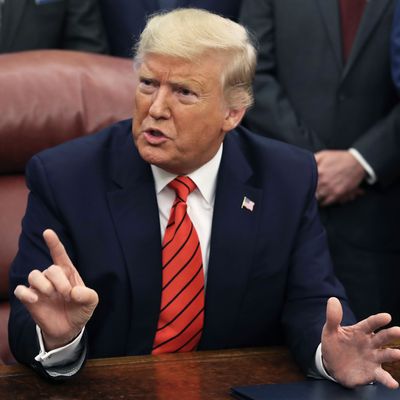
The smooth and congenial relationship between President Trump and William Barr went through a brief patch of turbulence last night, when Barr complained openly that Trump’s highly public tweets about criminal cases make it “impossible to do my job.” Barr is deeply committed to a Trumpian program of using his powers to protect Trump’s allies and harass Trump’s adversaries, but he also understands that the process requires a sheen of public legitimacy. He needs to maintain the façade that every discrete decision made on Trump’s behalf was made on its merits. Even despots like Vladimir Putin pretend the justice system is working independently, and not just leaving his friends alone and prosecuting people he wants to punish.
Last night, the White House gave official word that Trump had no issues with Barr’s comment. All seemed well again in despotville.
But then this morning, Trump felt the itch to clear something up. Trump maintains the right to ask Barr to prosecute, or not prosecute, anybody for any reason. He hasn’t done it, he says, but he could:
Obviously, if the president can direct anybody to be prosecuted or not, there is no rule of law. If there is no rule of law, there is no meaningful democracy.
Trump is notoriously uninterested in theory, and approaches every question from the most short-term possible perspective. Yet he is fanatical about asserting his completely untrammeled rights to turn the legal system into a personal weapon.
When Trump took office, he was initially told the Department of Justice would not allow him to use it as he saw fit. According to the Mueller report, when his lawyer told him he could not interfere in the Department’s handling of his own case, he exploded. “The President then brought up former Attorneys General Robert Kennedy and Eric Holder and said that they had protected their presidents,” it records. “The President also pushed back on the DOJ contacts policy, and said words to the effect of, ‘You’re telling me that Bobby and Jack didn’t talk about investigations? Or Obama didn’t tell Eric Holder who to investigate?’”
His frustration with what he considered an absurd limitation lasted throughout most of his first year. “You know, the saddest thing is that because I’m the president of the United States, I am not supposed to be involved with the Justice Department,” Trump told a radio interview that fall. “I am not supposed to be involved with the FBI. I’m not supposed to be doing the kind of things that I would love to be doing. And I’m very frustrated by it.”
But a month later, Trump had become convinced that he did possess this right. Asked by the New York Times if he wanted the Justice Department to reopen its investigation of Hillary Clinton’s email server, he explained, “What I’ve done is, I have absolute right to do what I want to do with the Justice Department. But for purposes of hopefully thinking I’m going to be treated fairly, I’ve stayed uninvolved with this particular matter.” He wasn’t investigating Clinton just then, but he could — it all depended on whether Trump himself was “treated fairly.”
Since this epiphany, Trump has proclaimed the “absolute right” to pardon himself for any crimes (not that there were any!). He has also insisted that he has the “absolute right” to ask any country to investigate any American for any reason he sees fit. On many occasions, Trump has gestured to Article II of the Constitution as the source of this authority. He has barely hidden his enthusiasm for this clause and the powers he believes it confers upon him. “It gives me all of these rights, at a level nobody has ever seen before,” he gushed at one point.
Trump’s allies like to pretend that he is not using the Department as his own private detective agency. Conservative media is filled with busy justifications for each individual instance. Of course the DOJ is right to scale back Roger Stone’s sentence, and create a process for sifting Rudy’s Russian-funded dirt, and investigate James Comey and Peter Strzok and Lisa Page and Andrew McCabe and James Brennan, and look into the Clinton email case and the Foundation again.
Not even conservative ideologues are prepared to openly defend the principle Trump insists he believes, because the nakedness of it is self-defeating. Trumped-up charges against your adversaries are worthless if they’re labeled as such.
A more dangerous and effective authoritarian party would find a leader who understands how to maintain appearances. That fact helps explain the habit Trump’s allies have of complaining about his tweets — and only his tweets, the one tiny flaw in his otherwise masterful handling of the job. Trump keeps blowing their cover.






























